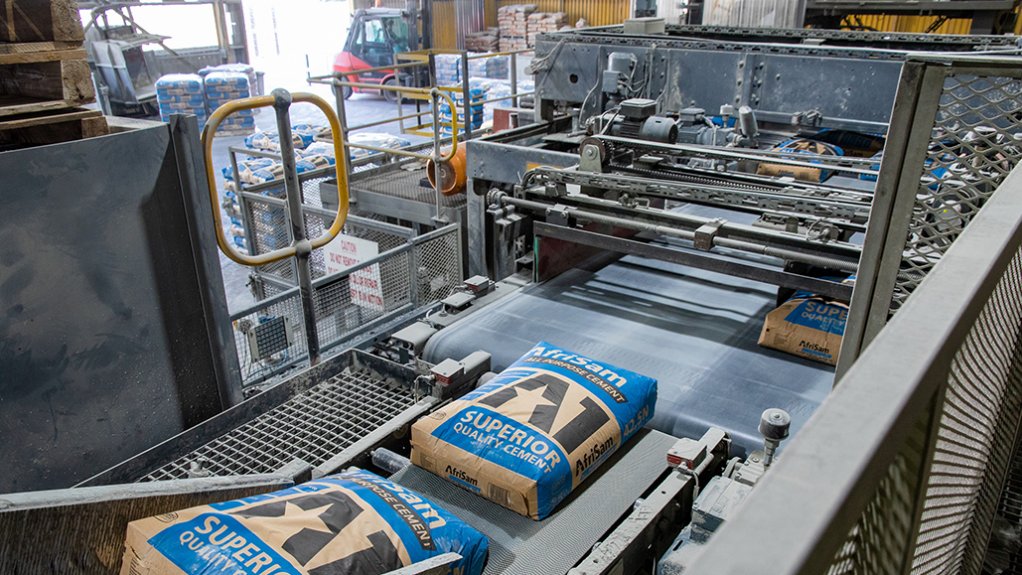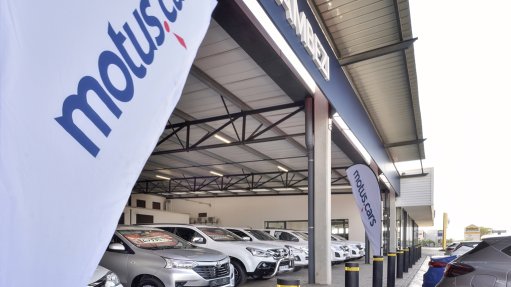Direct cement sales to industry drop


CONCRETE ASSURANCE Quality is not only about the product delivered but also the entire value chain
About 30% of cement sales in South Africa are going directly to the construction industry for construction projects, which is down from about 50% being sold directly to the construction industry about ten years ago, says cement manufacturer AfriSam sales & marketing executive Richard Tomes.
“We have seen a significant decline in direct sales to construction companies because of the lack of big projects and the lack of big infrastructure spend. If you take a forward-looking view on gross fixed capital formation and the forecasts for the building and construction industry, it’s not looking that positive, unfortunately.”
Market research firm Industry Insight economist David Metelerkamp said in a webinar hosted by AfriSam in March that the South African economy had been stagnating since 2015, with gross domestic product dipping below population growth on average.
Tomes explains that most of AfriSam’s cement sales currently comprise renovation work, most of which is through small- to medium-sized building contractors that buy their supplies from retail stores.
He says many companies are asking people to work from home because of Covid-19, resulting in much office space being vacated and converted into residential space.
“There isn’t a lot of large structural work happening, but conversion work and maintenance is ongoing, which is, fortunately, still helping the cement and aggregates industries – but it’s nowhere near where it used to be,” Tomes says.
Quality Control
Amid a tight market, Tomes believes that AfriSam’s approach to quality control is providing the company with a competitive advantage.
“A key part of the AfriSam quality deliverable is in the customer experience, and not only the product. Many customers see the cement, aggregate or concrete products we offer as commodities and, therefore, the same as the products of our competitors. Therefore, we differentiate ourselves through our quality offerings,” he explains.
He highlights the company’s mantra – “What goes into it matters” – to illustrate how the company defines quality.
“We believe that quality is not only about the product we deliver but also the entire value chain – from production to delivery. Customers don’t just interact with the product – they interact with us and, therefore, service quality is just as important as product quality,” he explains.
He notes that these interactions range from advising clients on their cement needs to ensure they get the right product and liaising with clients to arrange payment terms or proide a credit facility if needed, to ensuring that the correct amount of product is delivered to site on time.
Importantly, AfriSam boasts a quality index, which ensures peace of mind for the client that the product bought can meet the strength requirements for the job at hand.
“We have in-house processes that track and assess raw material inputs, with leading indicators from a cement operational perspective, an aggregate perspective and our readymix plants, that ensure product quality.”
Tomes adds that, should something go wrong after pouring and curing concrete or cement-based products, AfriSam will send out technical experts to site at no extra cost to assess the situation and provide advice and support on how to resolve the issue.
“Clients might get a similar product from someone else at a competitive price, but they won’t get the same level of service. Our entire recruitment process is geared around ensuring that our employees fit the culture of service and quality assurance.”
Quality & Infrastructure
Tomes notes that ensuring quality in product and service in the cement industry is important, since it is has a direct impact on the longevity of infrastructure.
He laments a prevalent mentality in South Africa that values price over quality.
“We want what is cheapest, and then we’re not very good at maintaining the infrastructure either, and so it doesn’t last. What we then end up with, is collapsing infrastructure and potholes.”
Tomes finds the local association of quality with only the product concerning. He believes that quality includes service, skills and design.
“All these factors – in addition to the product itself – contribute to quality infrastructure in South Africa, which is in line with our vision at AfriSam.”
Tomes adds that the cement and concrete industry bodies want to engage government on, for example, the standard of imports and how it impacts on infrastructure quality.
“Our country cannot afford to keep maintaining poor-quality infrastructure. We would be doing citizens a disservice if we did not advise them correctly on the right products and offer the best services and skills possible.”
He is also critical about the general sentiment, which values price over quality, regarding the awarding of tenders.
Industry body Consulting Engineers South Africa (Cesa) last year embarked on a drive to raise awareness regarding quality cost-based selection (QCBS) in the public and private sectors.
Cesa CEO Chris Campbell told Engineering News in April last year that, despite efforts over the past few years to promote such selection, the industry had showed “no progress”.
“We need to re-evaluate the tendering system and ensure that the awards are given to those who not only offer the cheapest solution, but who also can prove to deliver quality competitively,” Tomes concludes.
Article Enquiry
Email Article
Save Article
Feedback
To advertise email advertising@creamermedia.co.za or click here
Press Office
Announcements
What's On
Subscribe to improve your user experience...
Option 1 (equivalent of R125 a month):
Receive a weekly copy of Creamer Media's Engineering News & Mining Weekly magazine
(print copy for those in South Africa and e-magazine for those outside of South Africa)
Receive daily email newsletters
Access to full search results
Access archive of magazine back copies
Access to Projects in Progress
Access to ONE Research Report of your choice in PDF format
Option 2 (equivalent of R375 a month):
All benefits from Option 1
PLUS
Access to Creamer Media's Research Channel Africa for ALL Research Reports, in PDF format, on various industrial and mining sectors
including Electricity; Water; Energy Transition; Hydrogen; Roads, Rail and Ports; Coal; Gold; Platinum; Battery Metals; etc.
Already a subscriber?
Forgotten your password?
Receive weekly copy of Creamer Media's Engineering News & Mining Weekly magazine (print copy for those in South Africa and e-magazine for those outside of South Africa)
➕
Recieve daily email newsletters
➕
Access to full search results
➕
Access archive of magazine back copies
➕
Access to Projects in Progress
➕
Access to ONE Research Report of your choice in PDF format
RESEARCH CHANNEL AFRICA
R4500 (equivalent of R375 a month)
SUBSCRIBEAll benefits from Option 1
➕
Access to Creamer Media's Research Channel Africa for ALL Research Reports on various industrial and mining sectors, in PDF format, including on:
Electricity
➕
Water
➕
Energy Transition
➕
Hydrogen
➕
Roads, Rail and Ports
➕
Coal
➕
Gold
➕
Platinum
➕
Battery Metals
➕
etc.
Receive all benefits from Option 1 or Option 2 delivered to numerous people at your company
➕
Multiple User names and Passwords for simultaneous log-ins
➕
Intranet integration access to all in your organisation


















